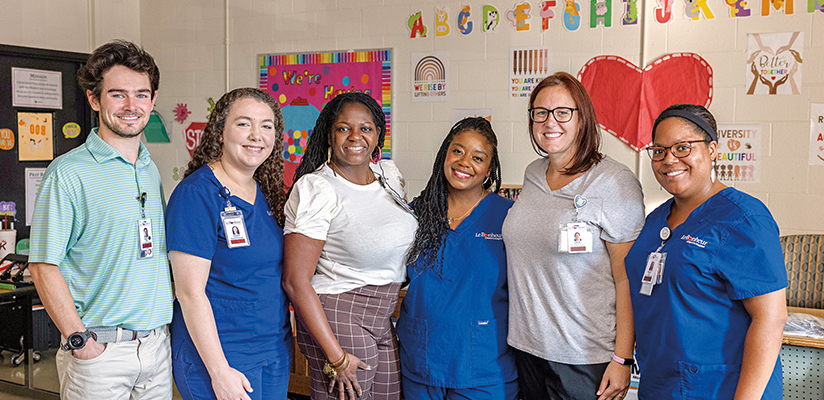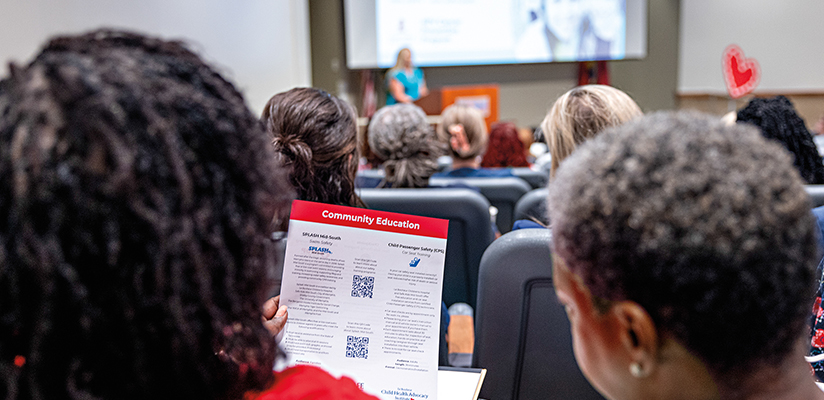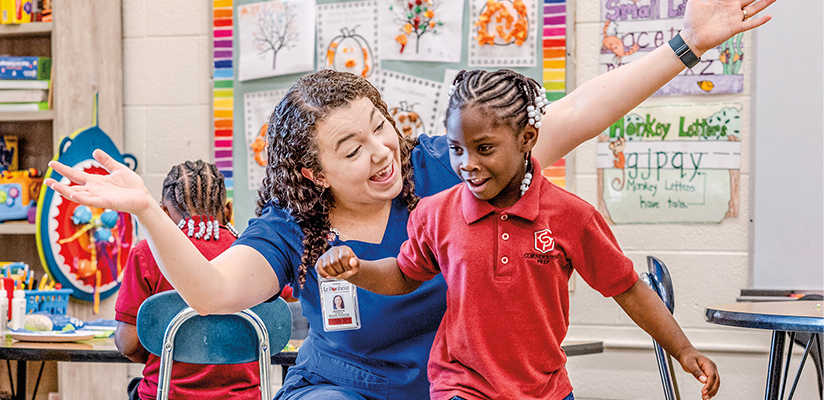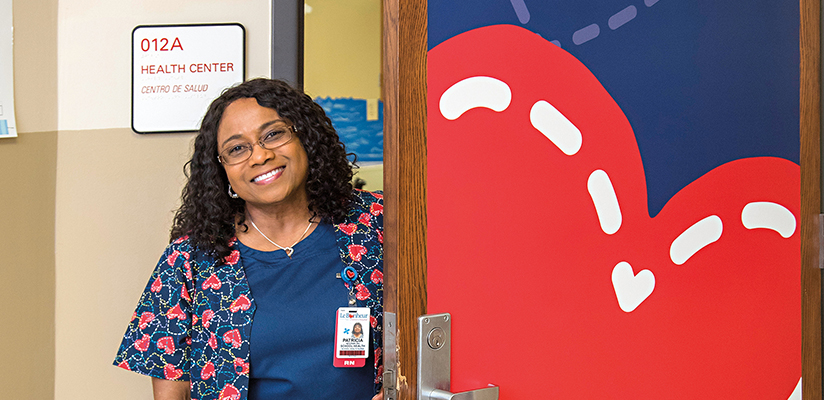Meeting Children Where They Are
One of the many ways Le Bonheur Children’s is improving health outcomes, addressing disparities and promoting healthier lifestyles for students across West Tennessee is by meeting these kids where they so often are: at school.
Le Bonheur’s school-based health services — including its robust school nursing and school-based therapy programs — focus on well-being for a whole community and provide essential support for children navigating a wide range of acute health concerns and chronic conditions. Grounded in a “whole child” wellness model that grants nurses and therapists greater insights into each student’s respective needs, these programs address components ranging from physical health and emotional well-being to family engagement, nutrition, physical environment and social determinants of health.
Expert Nursing for School Communities
Cindy Hogg, BSN, RN, Director of Health Services at Methodist Le Bonheur Community Outreach (MLCO), has witnessed firsthand how evidence-based nursing care in the school setting improves children’s health and, by extension, their ability to thrive in the classroom. A career nurse for 39 years and counting, Hogg understands the unique challenges children face today.

“The majority of kids in school are healthy — but are they really coming to school ready to learn, with all of their physical, social and emotional needs met?” said Hogg. For many students, especially those growing up in poverty or underserved communities, the answer is no. Beyond physical health concerns, students may struggle with emotional and social issues that make it difficult to focus on education. Le Bonheur’s school nursing program is designed to address these barriers by providing health services directly within the learning environment.
Staffed by 25 Le Bonheur nurses, the hospital’s school nursing program has served Tipton County Schools for 24 years, providing more than 40,000 care encounters annually to the district’s 10,000 students. Le Bonheur’s school nurses also serve approximately 4,000 students in Memphis through two charter school districts and one faith-based school.
“On more than a few occasions, parents have praised the decision to contract with Le Bonheur for the provision of a nurse in each of our schools,” said Dr. John Combs, Superintendent of Tipton County Schools. “Our school nurses offer more than just aid to our kids; they are instrumental in providing a sense of well-being to the entire student body.”
From administering medications and providing first aid to helping students manage chronic conditions such as asthma, allergies, diabetes, spina bifida and seizure disorders, these nurses help students stay well and in class, allowing educators to focus on teaching by offering dedicated support when health problems arise. This work extends beyond the schools themselves; nurses also engage and educate families, helping parents better manage their children’s health at home and connecting them with specialized services as needs arise.

“Some people may not realize that we take care of acutely ill, medically fragile children in the school environment,” said Hogg. “The school nursing landscape has changed so much in the past 25 years; we have kids coming to school who may be on chemo, or require a catheterization or G-tube feeding. Our job is to ensure our nurses have the proper training and resources to provide the necessary interventions in the school setting.”
Recognizing the need for ongoing education and support for school-based nurses, especially those practicing in underserved communities, Le Bonheur recently hosted a back-to-school conference attended by more than 100 school nurses from across West Tennessee. Sponsored by the Meri Armour Fund — an endowment founded to secure Le Bonheur’s future, train the next generation of caregivers and honor the legacy of the hospital’s 8th president and CEO — the conference addressed potential gaps in training, covering topics ranging from vaping to asthma management and cardiac health in student athletes. The event also featured practical, hands-on skills sessions on managing tracheostomies, feeding tubes, and other complex medical devices common in schools today.
“We can’t tell a child with a complex need they can’t come to school because there’s no nursing care,” said Hogg. “Schools and nurses seeking guidance were coming to us, asking, ‘Where do we go for help?’ The conference was Le Bonheur’s response — a way to ensure that no student is left behind due to a lack of health resources in their school.”
For Hogg, the most rewarding part of this work lies in the success stories she’s witnessed over the years — from the new hires who fall in love with nursing to the children with chronic conditions who learn to live independently.
“Seeing a child who has experienced health struggles grow and take control of their illness, learning to live with it, manage it and thrive despite the obstacles, is a very powerful and rewarding experience,” said Hogg.
Empowering Students with School-Based Therapy
Beyond school-based nursing, Le Bonheur has been delivering school-based therapy (SBT) services to students across Memphis and rural West Tennessee for over a decade. This program, which annually serves 600-700 kids, embeds therapeutic interventions directly into the school setting, allowing children to receive critical developmental support in environments where they spend much of their time. Services include physical therapy (e.g., gross motor control and coordination for safely navigating stairs, playground equipment and the classroom setting), occupational therapy (e.g., fine motor control and coordination for handwriting, cutting and using hand tools, as well as sensory and behavioral regulation) and speech-language pathology (e.g., support with articulation, verbal expression, listening comprehension and alternative communication device training).
At its core, school-based therapy is about more than meeting physical or developmental goals — it’s about inclusion and empowerment.

“Take the first grader who needs to make a paper pumpkin today — not tomorrow when her arms or hands are stronger,” said Jackie Bryson, MLCO Rehab Services Supervisor for Occupational and Physical Therapy. “Our therapists are there to help that student shore up whatever skills she needs to complete her paper pumpkin, so she can feel the same sense of pride as her classmates.”
According to Bryson, who has worked in school-based therapy for more than 25 years, the program’s primary focus is ensuring that all children, regardless of their abilities, have the opportunity to participate fully in their learning environments. She recounted a particularly moving experience when a child with an orthopedic impairment was able to walk up the stairs independently at her kindergarten graduation, thanks to the coordinated efforts of her therapy team. In another case, a child with limited verbal skills was able to use their communication device to participate in their school’s holiday program. These triumphs of inclusion and independence speak to the profound impact school based therapy has on children’s lives.
The impact, too, extends far beyond each individual child served.
“I think people would be surprised by the far-reaching impact working with one student can have,” said Laura Beth Knight, MLCO Rehab Services Supervisor for Speech-Language Pathology. “You’re not just working with that student — you’re also working with their teachers, and other kids benefit as well, because our therapists spend time in the classroom and share lessons and adaptations with the class as a whole.”
What sets Le Bonheur’s school-based therapy program apart is its holistic, evidence-based approach. Therapists don’t just treat a child’s immediate physical, occupational or speech needs — they look at the broader picture, factoring in the emotional, social and academic challenges children face. The program’s school-based therapists work closely with teachers, administrators, students and families to create individualized plans for each child receiving services, ensuring their unique needs are met in real-time.
“When behaviors or traits are identified as an individualized need, rather than a problematic behavior, it can make a massive difference in how a child is perceived by peers and educators, and how they feel about themselves,” said Danielle Keeton, Le Bonheur’s senior director of Rehab and Developmental Services. “This program creates space to maximize the educational potential for kids, and can change the trajectory of children’s lives.”
For schools like Libertas School of Memphis, which serves a high percentage of children with special needs, the program has been transformative. “As the host of the largest special education program of any Tennessee charter, Libertas is grateful for many years of partnership with Le Bonheur for school-based therapy,” says Bob Nardo, Executive Director and Founding Head of Libertas. “Le Bonheur is one of the reasons why Libertas students with disabilities are achieving in the top 15% of their peers across the state.”
Similarly, a partnership with Le Bonheur has helped students at Journey Community Schools (JCS) achieve significant academic and developmental gains. According to Monicah Branch, Managing Director of Special Populations and Student Services for JCS, the Le Bonheur led integration of the Ready Bodies Learning Lab into the school’s classrooms has been a game-changer for students, backed by the therapists’ “unmatched expertise and genuine commitment to the well-being of students.”
“We were able to see gains in our students’ development within one semester of this program,” said Branch. “School-based therapy not only supports students with specific needs but also enriches the school culture by promoting collaboration and continuous growth. This holistic approach strengthens the entire JCS community, fostering an inclusive and supportive learning environment.”

Allonda Meriwether, a Le Bonheur speech-language pathologist serving at Cornerstone Prep-Lester Elementary, emphasizes the collaborative, community focus at the heart of the school-based therapy program. Meriwether works at a school established for students living in some of the city’s highest areas of need.
“We have the unique opportunity to serve our city’s schools and families by offering high-quality therapy services to children in our most vulnerable communities,” said Meriwether. “Advocating, educating and partnering with community schools has truly been the highlight of my career.”
For many families, Le Bonheur’s school-based therapy is not just a service — it’s a support system that extends well beyond the classroom, and stands as a model of what’s possible when healthcare and education work together for the well-being of children. Scarlet Crain, director of Educational Rehab at Le Bonheur, highlights the deep relational value of the program’s continuity, as some therapists may work with the same children from pre-K through 12th grade.
“We know these families, we’ve built their trust, and we can get them back into their medical centers when needed,” said Crain. “School based therapy serves to bridge the gap for children with special needs between their families, the medical world and the educational world, so they can meet their maximum potential independence in life.”
Help us provide the best care for kids.
Le Bonheur Children's Hospital depends on the generosity of friends like you to help us serve 250,000 children each year, regardless of their family’s ability to pay. Every gift helps us improve the lives of children.
Donate Now













